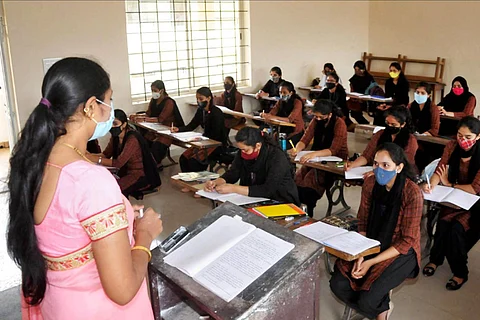

Graduation colleges run by the state government under the Higher Education Department across Karnataka including those in Bengaluru, are facing a severe shortage of teachers. The shortage is so acute that students have had to stage protests over the issue. For years, permanent faculty for these colleges have remained low and guest lecturers are being recruited on a yearly basis to make up for the shortage.
Final year students from the Maharani’s Arts, Commerce and Management College for Women resorted to protests earlier this week by sitting in front of their college gate, stating that although they have seven subjects as part of the course, only two subjects are being taught for the last three months since the college reopened after the COVID-19 lockdown.
“From the time college has restarted, we have been asking our principal when the guest lecturers will start to teach. Constantly, we are being told that it will happen this day or that day. Till today, it hasn’t happened, so we couldn’t wait anymore,” said Bhavana (name changed on request).
The students fear that they will be forced to attend the exams without being taught. When asked about why the situation was so dire, Manjunath T, Principal, Maharani's Arts and Commerce College, suggested that efforts were being made to hire more teachers on an ad-hoc basis.
“We need 70 lecturers but only 28 have been given. Government has only allowed 50% of those who taught last year to teach this year. We will try our best to complete the syllabus with the time remaining. The students need not protest as we also wish for their benefit and we will solve all of their problems. This problem is not restricted to our college but across 400 colleges in the state,” he told TNM.
Students of Government Arts College in Bengaluru said that they are also facing a similar problem.
“We don’t have lecturers for multiple subjects. We are currently having combined classes with other sections and other streams, just so they can engage the classes,” Shanti, a second-year student said.
The situation is no better in districts away from cities like Bengaluru and Mysuru.
Amar, a student of Government First Grade College in Dharwad said, “In the previous years, we used to have guest faculty but this year, there is no guest faculty. The lecturers are struggling to take classes and we are not having practical classes. At this pace, the syllabus cannot be completed before exams.”
Similarly, Eranna, a student of Sarladevi College in Ballari said that while usually, 130 guest faculty members are hired every year to make up for the low number of permanent faculty. This year, they have not been appointed. This has resulted in students having to attend a single or two classes in a day on average.
The Hindu on Sunday reported that while 14,000 such guest faculty were to be hired, only 7,000 have been hired. The report stated that the Finance Department is yet to approve the Higher Education Department's proposal to hire the other 7,000.
Niranjanaradhya VP, Senior Fellow and Programme Head, Universalisation of Equitable Quality Education Programme, Centre for Child and the Law, at National Law School of India University said that the current policy of hiring ad-hoc faculty is the problem.
“The problem really is that we are not making permanent recruitment. Whenever there are vacancies, permanent appointments need to be made. Only then, we can do justice to students. Contractual appointments won’t serve any purpose as there is no job security and because of that, they don’t show much interest. What research shows is that when there is permanency in a job, automatically the job satisfaction goes up, making them engage with students in a full-fledged way,” he told TNM.
“Permanent appointments are key to smoothen this process and it also increases the quality of teaching. The government should stop this ad hoc arrangement. I feel that we must do away with this contractual appointment as it doesn’t help the learning process. This is a neo-liberal model of hire and fire where they don’t want to provide social security and sectors like education and health are not a priority for the government now, unlike earlier. After 1990, education became open for privatisation and commercialisation,” he added.